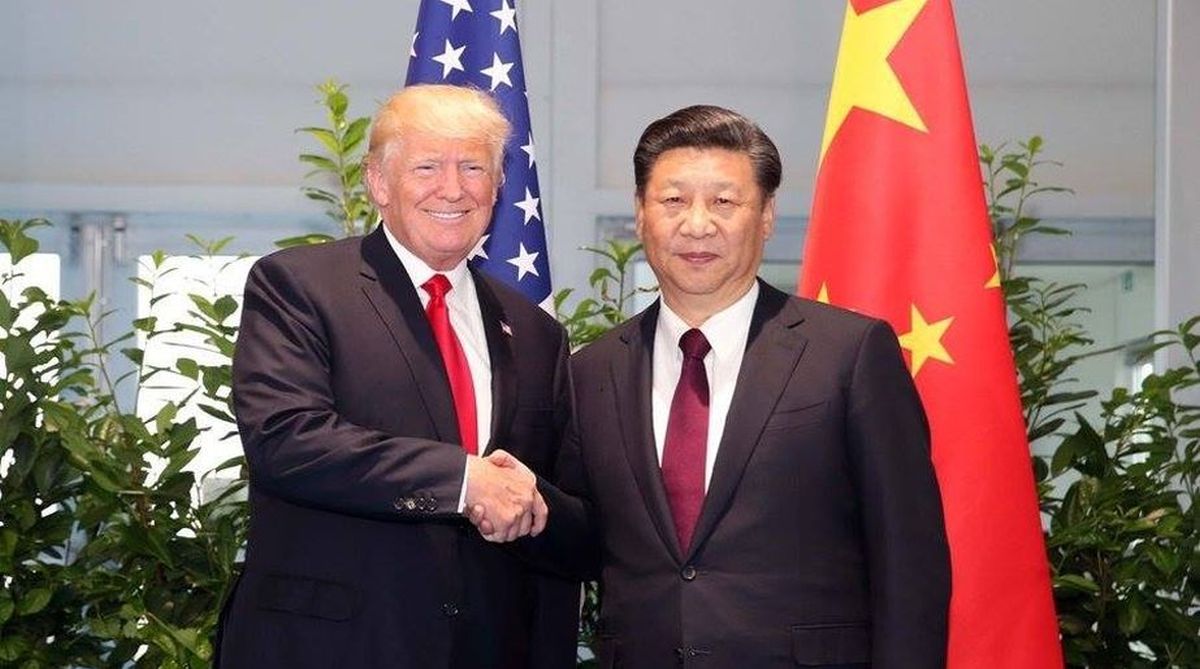PM Modi reaches Brazil for G-20 Summit
The PM reached Rio de Janeiro after concluding a successful visit to Nigeria.
“This will be a one-on-one with Gov. Yi to talk alone about the trade issues,”

US President Donald Trump (R) and Chinese President Xi Jinping (L) (Photo: Facebook)
US Treasury Secretary Steven Mnuchin said Saturday that he plans to speak privately with China’s central bank governor about trade on the sidelines of annual Group of 20 finance talks in southern Japan, but has no direct message to give him.
Mnuchin and Yi Gang, chairman of the People’s Bank of China, are due to hold routine talks on various issues and then break away for their discussion on trade. Yi, he noted, has participated in now-stalled talks between Washington and Beijing over the trade and technology dispute between the two largest economies.
“This will be a one-on-one with Gov. Yi to talk alone about the trade issues,” Mnuchin told reporters in the Japanese city of Fukuoka. But he added, “I would expect the main progress will be at the G-20 meetings of the presidents.” He said there were no plans for trade talks in Washington or Beijing before Presidents Donald Trump and Xi Jinping are due to meet in Osaka for the G-20 summit on June 28-29.
Advertisement
The Trump administration began slapping tariffs on imports of Chinese goods nearly a year ago, accusing Beijing of using predatory means to lend Chinese companies an edge in advanced technologies such as artificial intelligence, robotics and electric vehicles.
Those tactics, the US contends, include hacking into US companies’ computers to steal trade secrets, forcing foreign companies to hand over sensitive technology in exchange for access to the Chinese market and unfairly subsidising Chinese tech firms.
Trump has also complained repeatedly about America’s huge trade deficit with China a record USD 379 billion last year.
The United States now is imposing 25 per cent taxes on USD 250 billion in Chinese goods. Beijing has counterpunched by targeting USD 110 billion worth of American products, focusing on farm goods such as soybeans in a deliberate effort to inflict pain on Trump supporters in the US heartland.
The US side has been preparing to expand retaliatory tariff hikes of 25 per cent on another USD 300 billion of Chinese products, and Mnuchin indicated it was prepared to take that step if negotiations with Beijing fail. But he said Trump had not yet made a decision on that, suggesting room for further delays depending on the outcome of his discussion with Xi later this month.
Asked if other financial leaders attending the meetings in Fukuoka were raising the issue, Mnuchin said no. But he acknowledged the slowdown in Europe, China and other regions.
“I’m hearing concerns if we continue on this path there could be issues. There will be winners and losers,” he said.
Mnuchin and other officials in the Trump administration assert that the winners from the tariffs standoff, including the United States, will benefit from investments by companies moving their operations out of China to avoid the tariffs.
Countries were welcoming news that after a flurry of negotiations, Trump said he would refrain from imposing 5% tariffs on products from Mexico after it “agreed to take strong measures” to stem the flow of Central American migrants into the United States.
The tariffs that had been scheduled for Monday were “indefinitely suspended” after the two sides signed an agreement, he said in a tweet.
“It’s a good thing,” Japan’s central bank governor, Haruhiko Kuroda, told reporters. The agenda for the G-20 talks in Fukuoka on Saturday were mainly concerned with reforms of tax policies, combatting money laundering and cybercrimes, and innovations in financial technologies.
Japan is hosting the G-20 for the first time since it was founded in 1999. As trade conflicts percolate and leaders come and go, the finance chiefs have carried on chipping away at financial reforms and other perennial issues.
They debated Saturday over how to revise tax systems to ensure big companies pay their fair share and support economies as global growth slows.
Some European members of the G-20, especially, want to see minimum corporate tax rates for big multinationals. Mnuchin said he disagreed with details of some of the proposals but not with the need for action.
One aim is to prevent a “race to the bottom” by countries trying to lure companies by offering unsustainably and unfairly low tax rates as an incentive.
Ensuring governments capture a fair share of profits from the massive growth of businesses like Facebook and Amazon has grown in importance over the many years the G-20 finance chiefs have been debating reforms aimed at preventing tax evasion and modernising policies, as financial markets and businesses have been transformed by technology.
“Everyone, we are now facing a turning point,” Japanese Finance Minister Taro Aso told the group. “This could be the biggest reform of the long established international framework in over 100 years.
Advertisement